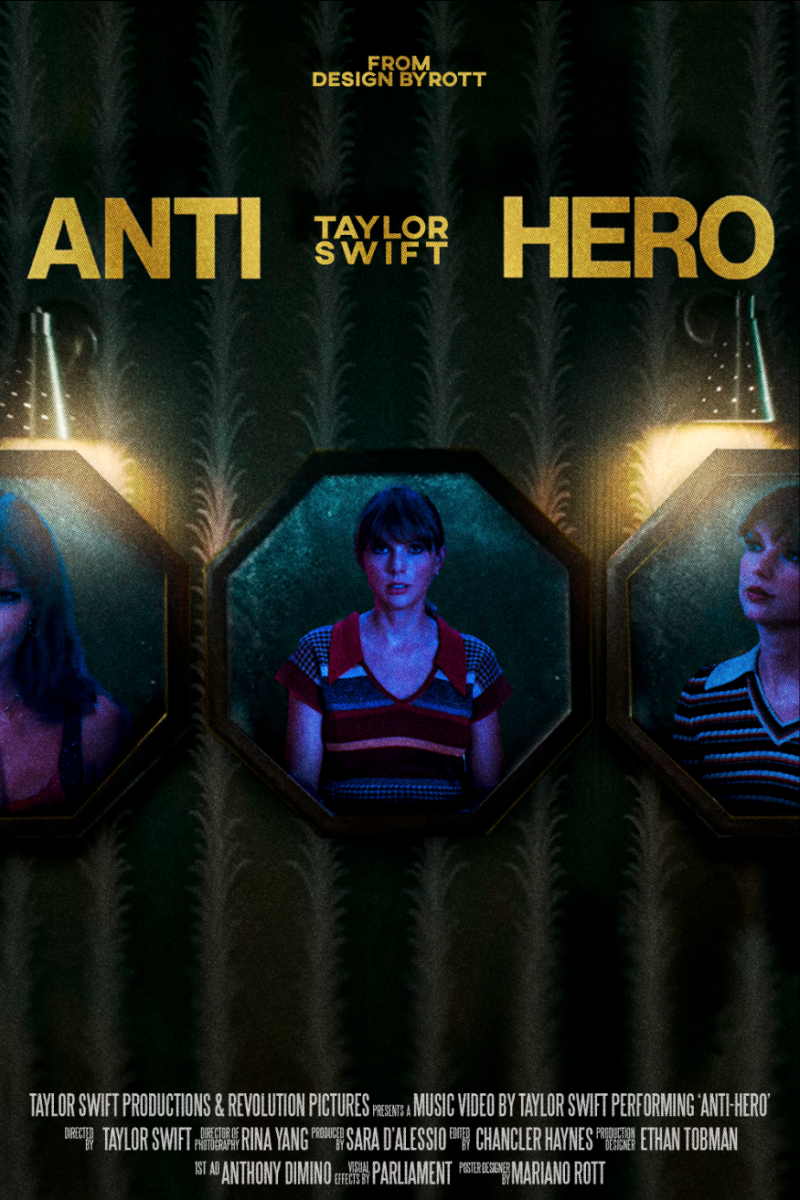On Friday, Oct. 21, at precisely 12 a.m. EDT, Taylor Swift released her highly anticipated 10th studio album, “Midnights’ (2022).’ Swift’s chaotic album rollout and release was followed with a surprise announcement of seven new tracks at 3 a.m. the same night and the premiere of the “Anti-Hero” music video at 8 a.m. the next morning.
Written and directed by Swift herself, the “Anti-Hero” music video is a satirical yet powerful deep dive into the artist’s darkest thoughts and harshest insecurities. Filled to the brim with nuanced expressions, clever symbolism and, knowing Swift, a slew of Easter eggs, “Anti-Hero” is one of the singer’s most soul-baring and naked projects to date.
The video begins with Swift sitting at the dining room table in a ‘70s-style home decked out in the same retro-chic look her marketing team promoted throughout the course of the album rollout. She is then greeted by several unthreatening, if not comical, ghosts in paisley-printed bed sheets, as well as the more sinister threat: a glamorous and glittering clone of Swift herself. Playing with the concept of her own duality and self-destruction, Swift and her double proceed to implode together, slamming shots, breaking a guitar and conducting a lesson where one version of the pop star bluntly instructs the other to believe that everyone in her life will ultimately betray her.
Examining the song and music video as separate entities, it is not hard for listeners to tell that, at its core, “Anti-Hero” is about being your own worst enemy. With the deliberate juxtaposition of the song’s bouncy-pop chorus with Swift’s cynical and self-critical lyrics, such as “I’ll stare directly at the sun, but never in the mirror,” and “It must be exhausting always rooting for the anti-hero,” it is implied that Swift not only sees herself as the villain in her own story, but in the stories of everyone around her.
In the next part of the music video, the scene transitions to a different, more sophisticated dining room, where elegantly dressed visitors are enjoying a meal when they are promptly interrupted by a gigantic version of Swift attempting to crawl through the entryway. In this Alice In Wonderland-esque portrayal of the pop star’s insecurities, it appears that Swift’s monstrous size is insinuating that she feels grotesque or crude next to the other shiny new toys of the music industry, or in this case, the petite party-goers. After being shot by an archer — a reference to her equally self-critical 2019 hit, “The Archer” — Swift covers her wound with a political campaign button that reads “Vote for Me For Everything,” and strikes a stoic pose, insinuating that she feels hypocritical or performative in her altruism toward others.
While the entirety of “Anti-Hero” is filled with clever symbolism and potential references to Swift’s past, the most notable instance of this occurs during the song’s bridge as viewers are presented with a campy depiction of the pop star’s own funeral. In a technique reminiscent of Swift’s 2017 music video for “Look What You Made Me Do”, the lead single from her “reputation” album, the music pauses mid-video for a theatrical portrayal of how Swift imagines her future children will bicker over the dead artist’s assets rather than mourn the death of their own mother, a humorous yet melancholic depiction of what appears to be one of her many fears regarding fame.
Although “Midnights” has already received numerous comparisons to “reputation” (2017) by Swift’s fans due to stylistic similarities, the main contrast between the two comes in the form of subject matter. While the scene in “Look What You Made Me Do” highlights the idea that Swift is haunted by versions of her past, “Anti-Hero” is an eerie depiction of the pop star being haunted by the possibility of a tumultuous future.
Overall, while some have criticized Swift’s symbolism in “Anti-Hero” for being trite or even cliche, others recognize that the repetitive nature or “overuse” of certain shared mental-health experiences may be deliberate; after all, Swift is nothing if not intentional. Furthermore, it is important to keep in mind that “Anti-Hero,” despite being thematically complex, is a pop song on a pop album. In both video and lyricism, the song is intended to be a more upbeat portrayal of self-loathing, rather than emanating the same level of somber depth seen on “folklore” (2020), and “evermore” (2020).
All things considered, “Anti-Hero” was a strong opening video for the “Midnights” album, leaving fans interested to see what creative turn Swift takes next.










